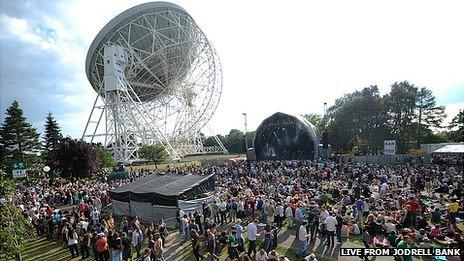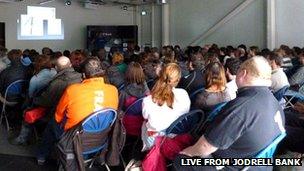Jodrell Bank gigs held to entice 'scientists of the future'
- Published

The stage at Live from Jodrell Bank stands in the shadow of the Lovell Telescope
Outdoor gigs have become so common a part of the English summer that organisers now have to offer something special to set themselves apart.
At Live from Jodrell Bank, a series of shows in the Cheshire countryside, the uniqueness seems obvious, as the stage sits alongside the iconic Lovell Telescope.
The past two years have seen Elbow, The Flaming Lips, I Am Kloot and more play in its shadow, and four day-long shows headlined by New Order, The Australian Pink Floyd, Sigur Ros and the Halle Orchestra respectively will take place this summer.
However, it is not the awe-inspiring nature of the backdrop that make the shows unusual, but the offerings away from the main stage - a host of science activities including a chance to "make your own graphene" and an exhibition on the Large Hadron Collider.
'White, male, middle-class'
While such things are undoubtedly entertaining, Dr Teresa Anderson, the director of Jodrell Bank Observatory's Discovery Centre, says there is a serious idea at work.
"The point is to get people who wouldn't go to a science centre to come along and engage with the science," she says.
"We did an analysis of the demographic of the observatory's visitors and we found most were white, male, middle-class and over 50.
"Our aim here is to inspire the scientists of the future and, with the best will in the world, those people are the scientists of the present, not of the future.
"It's really hard to get younger people into science but the 16 to 35 age group will go to concerts, so we made a strategic choice to create an environment that they want to be in at a science location."
She says that while "the Halle and some of the other bands" may not attract a young audience, the point is to "create a climate within which young people and their families have a very positive experience and, as a result, a positive attitude towards science".
To that end, the festival has only one stage of music, with the rest being a "science arena" of stalls, talks and activities.
The Institute of Physics is one of the "external bodies" taking part and their head of public engagement Caitlin Watson says they "jumped at the chance" to be involved.
"We have similar aims - to give people good experiences of physics and enable them to realise the impact that physics has on their lives," she says.
She adds that at the gigs, staff can "talk with people who wouldn't normally attend a science event and challenge their perceptions".
"We know people will be attending because of the music, rather than the science, and that gives us a great opportunity to reach people we wouldn't normally and show them what they're missing."
'Telescope time'
Dr Anderson believes audience participation has been "massively successful" at the past events.
She puts that down to the festival atmosphere, coupled with the fact "the whole site is dominated by the Lovell Telescope" which means people are willing to give things a try.

People queue "for half an hour" to hear the talks at the events
"People vote with their feet - the fact that they queue to hear about the latest research tells you that they are interested, otherwise they would be sitting in the bar," she says.
"Obviously, we do evaluations, but you can see the success with your own eyes, as people queue for half an hour to listen to someone talk."
But staging the events on such a scientifically important site does bring issues.
"Everybody who comes is supposed to switch off their mobile, as the telescope is so sensitive, it could pick up a phone on Mars," she explains.
"However, we accept that when you have 10,000 people on site, there's going to be a sizable proportion who will miss the signs and within a concert, they are used to having their phones on."
As a result, the discovery centre "rent the telescope time, making a contribution to the research budget of the observatory while the concert takes place", which keeps everyone happy.
According to Dr Anderson, it is a compromise that is worth making if it encourages people to think differently about science.
The Live from Jodrell Bank concerts host the Australian Pink Floyd on 6 July, New Order on 7 July, Sigur Ros on 30 August and the Halle orchestra on 31 August.
- Published26 March 2013
- Published9 January 2013
- Published7 August 2012
- Published24 June 2012
- Published31 May 2012
- Published7 April 2011
- Published22 March 2011